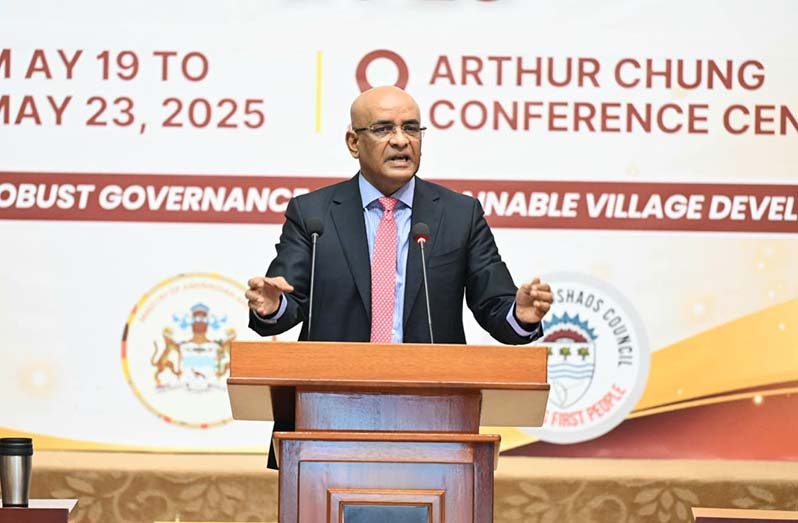–to support hinterland communities, Jagdeo says
ADDRESSING more than 200 Indigenous leaders, Vice-President Bharat Jagdeo on Tuesday said that the government is prepared to invest in an airline service, should local commercial
operators continue to ‘unfairly’ increase the cost of domestic flights.
The Vice-President, in his address at the ongoing National Toshaos Council (NTC) Conference being held in Georgetown this week, acknowledged that the cost to transport both citizens and goods into hinterland communities has increased, placing a burden on village economies.
This has been a recurring concern for Toshaos (Indigenous village leaders).
Back in 2022, several Toshaos had highlighted that the high airfares are contributing to a significant increase in the price of basic commodities.
The village leaders had said that while the infrastructure to facilitate air traffic was in place, there had not been many frequent flights during that period. Some hinterland communities can only be accessed by air.

“It seems as though, before every NTC, these aircraft operators raise the rate; it seems like they just wait before the NTC to raise the rates again,” the Vice-President acknowledged.
According to Jagdeo, the government has engaged operators who have claimed that “middlemen” would charter flights and then charge higher rates for persons and goods to be transported.
The Vice-President said: “If they can’t be reasonable about these rates, then the government will invest in a commercial arm of the GDF [Guyana Defence Force] to compete with them so that we can keep these freight rates down.”
The government, he noted, will also look at purchasing additional aircraft to address the growing concern.
Jagdeo said: “That’s a big concern of ours, because we on the coast, we have sought to tackle [the] cost of living by subsidising electricity and water and transportation… now so every gallon of gas you buy in Guyana or diesel, there’s a 500 to 600 Guyana dollars subsidy for the gas, because we wanted to keep the price down. But in [the] hinterland, the biggest concern has been the cost of moving people and goods into some communities.”
In 2024, the government had forgone approximately $80 billion in taxes by eliminating a 50 per cent excise tax on diesel and gasoline.
This measure is aimed at stabilising the cost of production and transportation in Guyana, despite global increases in fuel prices.
Jagdeo noted that the government will also look to further expand several airstrips across the hinterland regions, allowing for the accommodation of larger aircraft.
He said: “We plan to also upgrade and expand a lot of these airships so that bigger aircraft can go, and then, especially in areas they can’t go. And then, if you have another service, we’re going to operate a government-owned service if we can’t solve this problem of gouging.”
Further, in addition to works being done to upgrade community roads, major contracts to enhance regional travel is also on the cards.
This will be a multimillion-dollar investment connecting Regions Eight (Potaro- Siparuni) and Nine (Upper Takutu-Upper Essequibo).
Jagdeo said: “Ultimately, we have to connect all of the communities in Region Eight to Region Nine through a proper road, and we will continue to allocate contracts to those communities so that they can, they can build [connecting] roads.”



.jpg)








